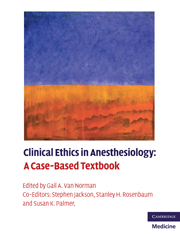
- Publisher:
- Cambridge University Press
- Online publication date:
- March 2012
- Print publication year:
- 2010
- Online ISBN:
- 9780511841361

Ethical issues facing anesthesiologists are more far-reaching than those involving virtually any other medical specialty. In this clinical ethics textbook, authors from across the USA, Canada and Europe draw on ethical principles and practical knowledge to provide a realistic understanding of ethical anesthetic practice. The result is a compilation of expert opinion and international perspectives from clinical leaders in anesthesiology. Building on real-life, case-based problems, each chapter is clinically focused and addresses both practical and theoretical issues. Topics include general operating room care, pediatric and obstetrical patient care, the intensive care unit, pain practice, research and publication, as well as discussions of lethal injection, disclosure of errors, expert witness testimony, triage in disaster and conflicts of interest with industry. An important reference tool for any anesthesiologist, whether clinical or research-oriented, this book is especially valuable for physicians involved in teaching residents and students about the ethical aspects of anesthesia practice.
'Rather than attempting to provide simple answers to … complex ethical problems, this book sets out to identify the principles underlying a wide variety of issues that a practising anaesthesiologist may encounter … [a] must-read textbook for all readers interested in addressing ethics issues in practice with the information essential to form proper and moral decisions.'
Martin Dauber Source: Journal of the American Medical Association
 Loading metrics...
Loading metrics...
* Views captured on Cambridge Core between #date#. This data will be updated every 24 hours.
Usage data cannot currently be displayed.